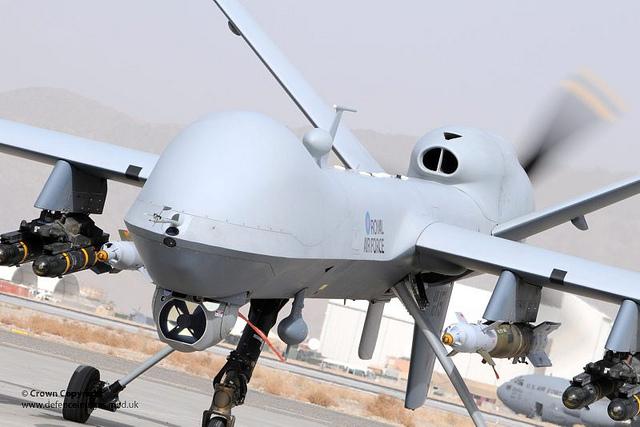Tail and teeth: human capital and Australian UCAVs
Posted By Steven Jones on March 3, 2015 @ 12:30
Unmanned combat aerial vehicles (UCAVs) certainly seem to be the flavour of the day. Media reports [2] suggest the RAAF is seeking eight MQ-9 Reaper aircraft at a total cost of around $300m. And Australia will also acquire [3] up to seven MQ-4C Tritons to operate with the P-8A Poseidon. The USAF currently operates three types of remotely piloted aircraft (RPA): the MQ-1 Predator, the MQ-9 Reaper (which is an improved version of the Predator) and the RQ-4 Global Hawk. UCAVs would enhance Australia’s current capabilities, and provide a number of new capabilities. But they’ll also bring additional costs and burdens.
The 2013 Defence White Paper identified Defence’s investing in people as a strategic priority, and that’ll likely continue to be an important component of the forthcoming White Paper. In adding the Reaper to Australia’s force structure, the government would do well to learn from the US Air Force’s experiences in maintaining UCAVs and other RPA, particularly the personnel problems which came to a head in January 2015.
In an internal memo to US Air Force Chief of Staff General Mark Welsh, Air Combat Commander (ACC) General Herbert Carlisle stated [4] that he was ‘extremely concerned’ about the compounding effects of the demands for more missions with fewer pilots:
ACC believes we are about to see a perfect storm of increased COCOM [Combatant Commander] demand, accession reductions, and outflow increases that will damage the readiness and combat capability of the MQ-1/9 enterprise for years to come.
Those problems have been brewing for years as operational demands for RPAs grew to support US operations in the Middle East. In April 2014, the Government Accountability Office published a report [5] on actions needed to strengthen management of RPA pilots. It found that USAF was not managing its human capital adequately, nor tailoring its recruitment and retention strategies to meet specific mission needs.
USAF pilot training takes about 10 months to complete, and is far cheaper, at around $65,000 per pilot, than equivalent undergraduate pilot training for manned aircraft, which costs approximately $557,000. As a guideline, the USAF requires 10 RPA pilots to sustain one Predator or Reaper for 24 hours, but in practice, ratios fluctuate between 7:1 and 8.5:1, and at times have dropped to 6:1. Each RPA can also require around 10 support members per RPA, including maintenance crews, intelligence analysts and sensor operators.
To address pilot shortage, the USAF has been raiding its training schools of qualified pilots, resulting in the training squadrons, known as Formal Training Units (FTU), having half the people they need. The USAF’s elite Weapons School for UCAV pilots was suspended to enable more training for new pilot operators. While the USAF needed to be training about 300 new RPA pilots in 2014, it was producing only 180—and losing 240 a year. Overworked crews had to deal with cancelled leave and damage to their careers because they couldn’t attend required professional military education courses.
In recent years, there’ve been issues in Australia regarding the classification of deployed personnel in war zones related to recognition, awards and pay. UCAVs would exacerbate those issues, particularly with in terms of mental health, as drone pilots face at least the same risks and problems as the pilots of manned aircraft.
A 2013 Armed Forces Health Surveillance Center study [6] found that there was ‘no significant difference in the rates of [mental health] diagnoses, including post-traumatic stress disorder, depressive disorders, and anxiety disorders’ between remotely-piloted and manned-aircraft crews. An earlier study found [7] that ‘The average MQ-1 crew—a pilot and sensor operator—was likely to show signs of severe fatigue more often than crews for any other ‘high-demand/low-density’ asset in the US military aircraft inventory’.
While the Predator and Reaper ‘requires a human pilot flying it by remote control every second it’s in the air’, more advanced RPAs such as the Global Hawk and Triton ‘require less constant hand-holding [8]’. However, one study [9] did find that for Global Hawk sensor operators, 34% reported burnout and 25% showed clinical distress.
In fiscally challenging times, it can be tempting to trim the tail to allow more teeth. But that can have the effect of reducing capabilities. If Australia does acquire the Reaper, it’ll be important to have the infrastructure needed to fully support it in place from the start, rather than trying to solve that problem later.
Steven Jones is a PhD student at ADFA. Image courtesy of Flickr user UK Ministry of Defence [10].
Article printed from The Strategist: https://aspistrategist.ru
URL to article: /tail-and-teeth-human-capital-and-australian-ucavs/
URLs in this post:
[1] Image: https://aspistrategist.ru/wp-content/uploads/2015/03/5755016315_f22847bb1b_z.jpg
[2] Media reports: http://www.news.com.au/world/the-australian-government-is-about-to-spend-300-million-on-self-piloted-killer-drones/story-fndir2ev-1227237502536
[3] acquire: http://www.airforce.gov.au/Technology/Aircraft/MQ-4C-Triton-Unmanned-Aircraft-System/?RAAF-BYjCaU6eHptQ3E2EiHw9jKOLJvauES8Y
[4] stated: http://www.thedailybeast.com/articles/2015/01/04/exclusive-u-s-drone-fleet-at-breaking-point-air-force-says.html
[5] published a report: http://www.gao.gov/products/GAO-14-316
[6] Armed Forces Health Surveillance Center study: https://timemilitary.files.wordpress.com/2013/04/pages-from-pages-from-msmr_mar_2013_external_causes_of_tbi.pdf
[7] study found: http://www.flightglobal.com/blogs/the-dewline/2008/04/study-flying-predators-bad-for/
[8] require less constant hand-holding: http://breakingdefense.com/2015/01/drones-need-humans-badly/
[9] study: http://www.reuters.com/article/2011/12/18/us-usa-drones-stress-idUSTRE7BH0VH20111218
[10] UK Ministry of Defence: https://www.flickr.com/photos/defenceimages/5755016315/in/photolist-7Tx3yN-9LxXRe
Click here to print.
